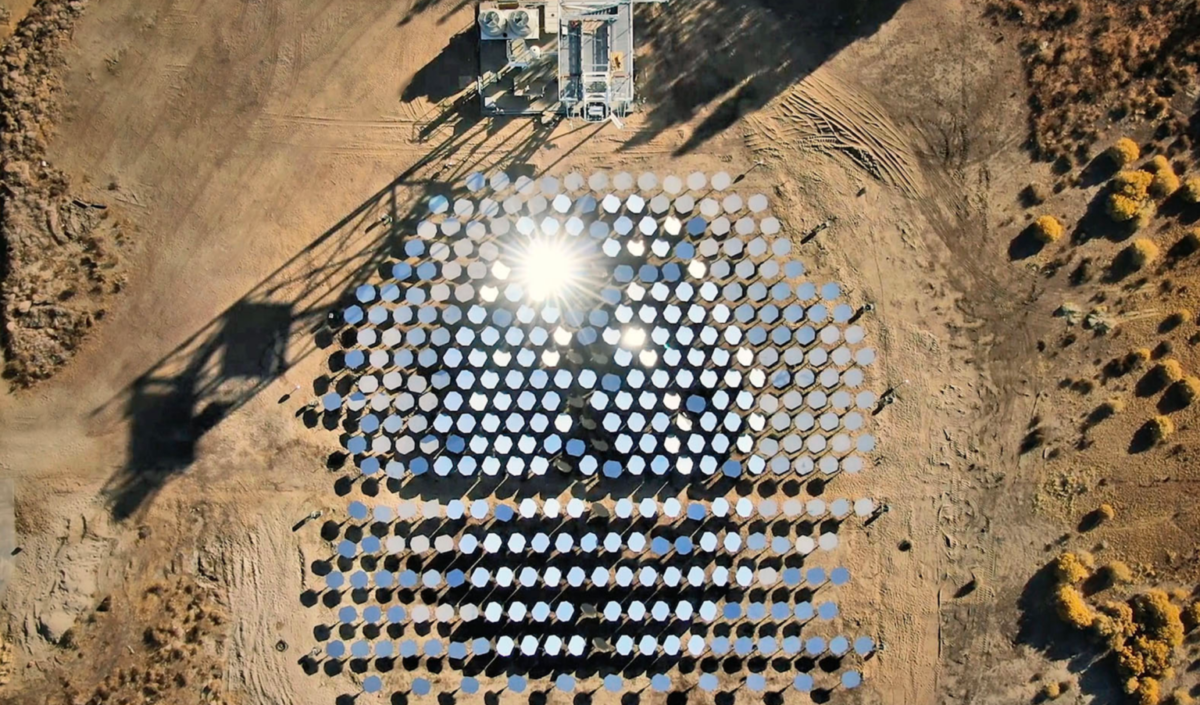From pv magazine USA
The U.S. Department of Energy (DoE) is betting big on supercritical carbon dioxide (sCO2) as the key to making concentrated solar power (CSP) a cost-competitive driver to decarbonize high-temperature manufacturing processes.
A single sCO2 project under development by Bill Gross’s CSP startup Heliogen is receiving $39 million of funding, versus the $1 million to $2 million doled out to others. According to the DoE website, Heliogen will use the money to “develop, build, and operate a supercritical carbon dioxide power cycle integrated with thermal energy storage, heated by concentrated solar thermal energy supplied by a newly built heliostat field.”
Heliogen’s proposed CSP plant uses sCO2 – essentially, CO2 that is halfway between gas and fluid – instead of steam to generate power. According to a 2015 DoE report, the use of sCO2 – which is twice as dense as traditional steam – is significantly more efficient than other types of turbine generation – lowering costs, water usage, equipment size and plant footprint.
According to a Nov. 12 announcement, the other 66 projects receiving DoE funding reflect a range of emerging and critical trends in the solar industry, from the use of artificial intelligence (AI) to non-wires solutions and agricultural applications; for example:
Arizona State University is receiving one of the smaller grants, $750,000, for research and development of an AI system that detects cell anomalies in solar panels, predicts failures and schedules maintenance.
StorEdgeAI, a Seattle-based startup, will use its $1.8 million grant to develop a non-wires distribution system that will circumvent the transmission and distribution grid to cut the delivered cost of solar energy to $0.15 per kWh by 2025.
Popular content
Solar developer Silicon Ranch will also get $1.8 million to develop a solar tracking and control system that integrates plant operation with cattle grazing.
The DoE’s support for CSP is not new. Since 2007, the department has provided about $575 million in support for CSP research, with increasing amounts going to sCO2 projects in the past few years. The goal, according to the DOE website, is to lower the cost of CSP to $0.05 per kWh for “baseload systems with 12 hours or more of thermal energy storage, without subsidies by 2030.”
Whether that target is achievable – and whether it could make CSP cost competitive with PV or wind – remains an open question. While the International Renewable Energy Agency (IRENA) recently reported that the levelized cost of energy (LCOE) for CSP fell 47% since 2010, hitting between $0.21 and $0.24 per kWh in the U.S. in 2019, it’s still more expensive than PV’s LCOE of less than $.07. IRENA is also projecting CSP international power purchase agreement prices of $0.075 per kWh for projects coming online in 2021.
What may have tipped the balance in the DoE’s decision to back Heliogen is the company’s next-generation CSP technology to produce temperatures of more than 1,000 C. Gross, a serial entrepreneur and founder of high-tech incubator Idealab, launched the company in November 2019 with backing from a trio of top investors – Microsoft founder Bill Gates, AOL founder Steve Case, and cancer drug entrepreneur Patrick Soon-Shiong.
According to Heliogen’s website, the “ultra-high temperature heat” produced by its more efficient CSP technology can be used to power a range of hard-to-decarbonize industrial processes, such as the production of cement, steel and petrochemicals. In other words, applications where PV may not be able to compete.
Author: K Kaufmann
This content is protected by copyright and may not be reused. If you want to cooperate with us and would like to reuse some of our content, please contact: editors@pv-magazine.com.


5 comments
By submitting this form you agree to pv magazine using your data for the purposes of publishing your comment.
Your personal data will only be disclosed or otherwise transmitted to third parties for the purposes of spam filtering or if this is necessary for technical maintenance of the website. Any other transfer to third parties will not take place unless this is justified on the basis of applicable data protection regulations or if pv magazine is legally obliged to do so.
You may revoke this consent at any time with effect for the future, in which case your personal data will be deleted immediately. Otherwise, your data will be deleted if pv magazine has processed your request or the purpose of data storage is fulfilled.
Further information on data privacy can be found in our Data Protection Policy.